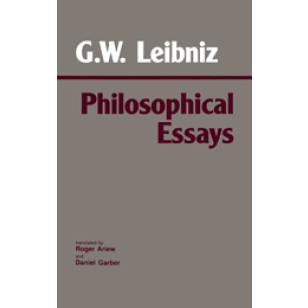Leibniz: Philosophical Essays
Although Leibniz's writing forms an enormous corpus, no single work stands as a canonical expression of his whole philosophy. In addition, the wide range of Leibniz's work—letters, published papers, and fragments on a variety of philosophical, religious, mathematical, and scientific questions over a fifty-year period—heightens the challenge of preparing an edition of his writings in English translation from the French and Latin.
Although Leibniz's writing forms an enormous corpus, no single work stands as a canonical expression of his whole philosophy. In addition, the wide range of Leibniz's work—letters, published papers, and fragments on a variety of philosophical, religious, mathematical, and scientific questions over a fifty-year period—heightens the challenge of preparing an edition of his writings in English translation from the French and Latin.
Contents:
Introduction.
Part I. Basic Texts
1. Letter to Foucher (1675) 2. Preface to a Universal Characteristic (1678-79) 3. Samples of the Numerical Characteristic (1679) 4. On Freedom and Possibility (1680-82?) 5. Meditations on Knowledge, Truth, and Ideas (1684) 6. On Contingency (1686?) 7. Primary Truths (1686?) 8. Discourse on Metaphysics (1686) 9. From the Letters to Arnauld (1686-87) 10. On Copernicanism and the Relativity of Motion (1689) 11. On Freedom (1689?) 12. The Source of Contingent Truths (1685-89?) 13. Notes on Some Comments by Michel Angelo Fardella (1690) 14. Preface to the Dynamics (1691?) 15. Dialogue on Human Freedom and the Origin of Evil (1695) 16. A Specimen of Dynamics (1695) 17. New System of Nature (1695) 18. Note on Foucher’s Objection (1695) 19. Postscript of a Letter to Basnage de Beauval (1696) 20. On the Ultimate Origination of Things (1697) 21. On Nature Itself (1698) 22. From the Letters to Bernoulli (1698-99) 23. From the Letters to de Volder (1699-1706) 24. To Queen Sophie Charlotte of Prussia, On What Is Independent of Sense and Matter (1702) 25. Letter to Coste, On Human Freedom (1707) 26. Response to Father Tournemine, On Harmony (1708) 27. From the Letters to Des Bosses (1712-16) 28. Principles of Nature and Grace, Based on Reason (1714) 29. The Principles of Philosophy, or, the Monadology (1714) 30. Letter to Samuel Masson, on Body (1716) 31. From the Letters to Wolff (1714-15).
Part II. Leibniz on His Contemporaries
A. Descartes and Malebranche: 1) Letter to Countess Elizabeth(?), On God and Formal Logic (1678?) 2) Letter to Molanus(?), On God and the Soul (1679?) 3) On the Nature of Body and the Laws of Motion (1690?) 4) On Body and Force, Against the Cartesians (1702) 5) Conversation of Philarete and Ariste (1712)
B. Hobbes and Spinoza: 1) Dialogue (1677) 2) Comments on Spinoza’s Philosophy (1707) 3) Two Sects of Naturalists (1677-80)
C. Locke: 1) From a Letter to Thomas Burnet, on the Occasion of Rereading Locke (1703) 2) From the Letters to Thomas Burnet, on Substance (1699) 3) From a Letter to Lady Masham, on Thinking Matter (1704) 4) Preface to the New Essays (1703-05)
D. Berkeley: 1) From a Letter to Des Bosses (1715) 2) Remarks on Berkeley’s Principles (1714-5)
E. Newton: 1) Absolute and Relative Motion, From letters to Huygens (1694) 2) Planetary Theory, from a Letter to Huygens (1690) 3) Against Barbaric Physics (170-16?) 4) From the Letters to Clarke (1715-6). Appendixes. Index.





